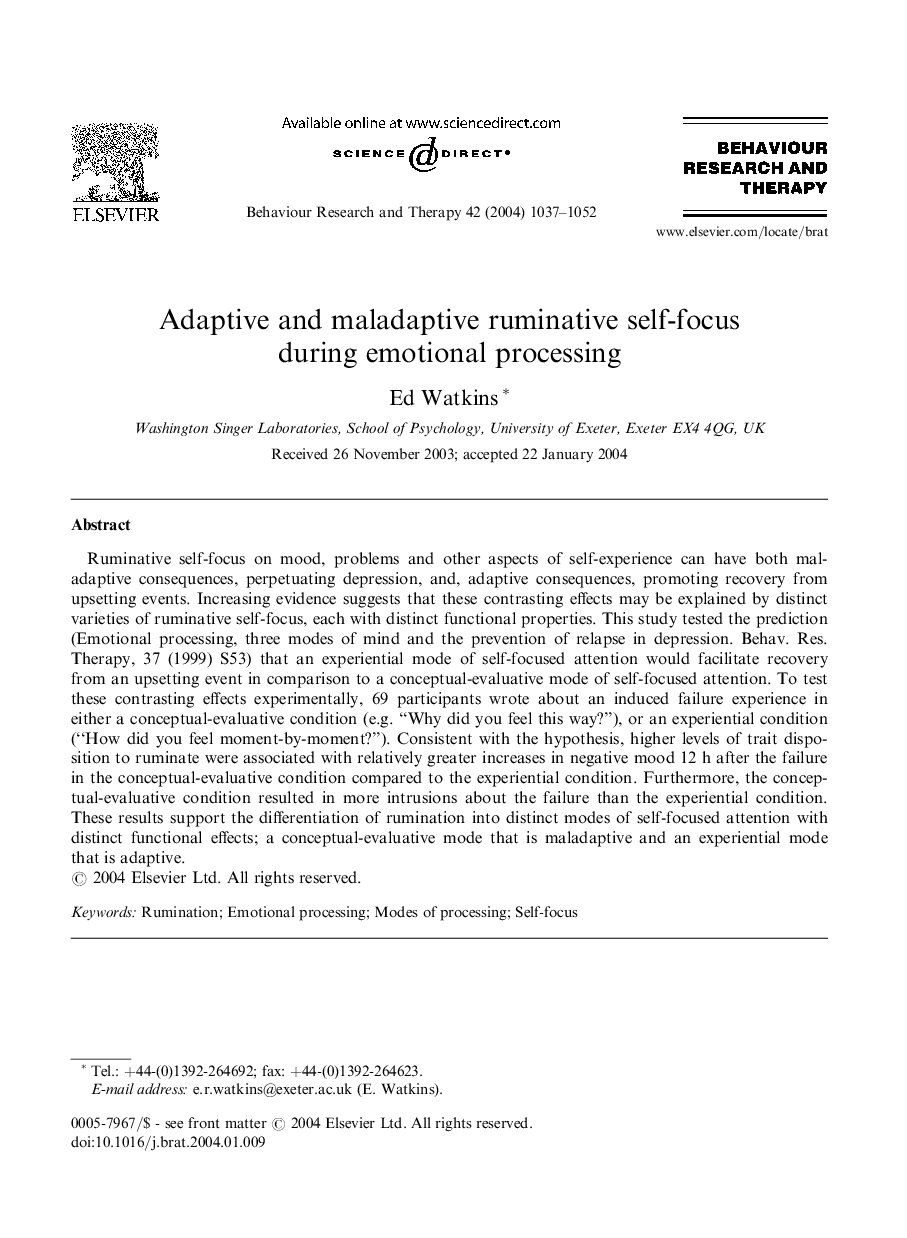Ruminative self-focus on mood, problems and other aspects of self-experience can have both mal adaptive consequences, perpetuating depression, and, adaptive consequences, promoting recovery from upsetting events. Increasing evidence suggests that these contrasting effects may be explained by distinct varieties of ruminative self-focus, each with distinct functional properties. This study tested the prediction (Emotional processing, three modes of mind and the prevention of relapse in depression. Behav. Res. Therapy, 37 (1999) S53) that an experiential mode of self-focused attention would facilitate recovery from an upsetting event in comparison to a conceptual-evaluative mode of self-focused attention. To test these contrasting effects experimentally, 69 participants wrote about an induced failure experience in either a conceptual-evaluative condition (e.g. “Why did you feel this way?”), or an experiential condition (“How did you feel moment-by-moment?”). Consistent with the hypothesis, higher levels of trait disposition to ruminate were associated with relatively greater increases in negative mood 12 h after the failure in the conceptual-evaluative condition compared to the experiential condition. Furthermore, the conceptual-evaluative condition resulted in more intrusions about the failure than the experiential condition. These results support the differentiation of rumination into distinct modes of self-focused attention with distinct functional effects; a conceptual-evaluative mode that is maladaptive and an experiential mode that is adaptive.
This paper will present an experimental study that is framed within the recent theoretical work of John Teasdale and builds upon work that started under his supervision. As such, I hope that this paper will serve as a grateful acknowledgement of the inestimable positive influence John Teasdale has had on my own thinking, career and life.
Rumination has been defined as “behaviour and thoughts that focus one’s attention on one’s depressive symptoms and on the implications of these symptoms” (Nolen-Hoeksema, 1991: p. 569). A large and consistent body of research has developed indicating the maladaptive and detrimental consequences of focus on depressed mood, problems, and other aspects of negative self-experience. Thus, increased self-focus is associated with depression (Ingram, 1990 and Pyszczynski and Greenberg, 1987) and rumination increases the likelihood, severity and duration of syn dromal depression (e.g. Just and Alloy, 1997, Kuehner and Weber, 1999, Nolen-Hoeksema, 2000 and Spasojevic and Alloy, 2001). In experimental studies, rumination intensifies dysphoric mood and negative thinking, whilst impairing problem solving (e.g., Lyubomirsky and Nolen-Hoeksema, 1995, Lyubomirsky, Tucker, Caldwell and Berg, 1999 and Watkins and Baracaia, 2002).
However, on the other hand, focus on depressed mood, problems, and other aspects of negative self-experience can have beneficial and adaptive outcomes. First, prolonged focus on negative emotional material is hypothesized to be an essential component of successful emotional processing, defined as “a process whereby emotional disturbances are absorbed and decline to the extent that other experiences and behaviour can proceed without disruption” (Rachman, 1980: p. 51). Indeed, evidence from expressive writing studies indicates that repeated focus on upsetting and emotional events and associated thoughts and feelings produces long-term improvements in mental and physical health (e.g. Esterling, L’Abate, Murray and Pennebaker, 1999, Pennebaker, 1993, Smyth, 1998 and Spera, Buhrfeind and Pennebaker, 1994), as well as reductions in negative mood or depressive symptoms over shorter time periods (Hunt, 1998 and Lepore, 1997).


